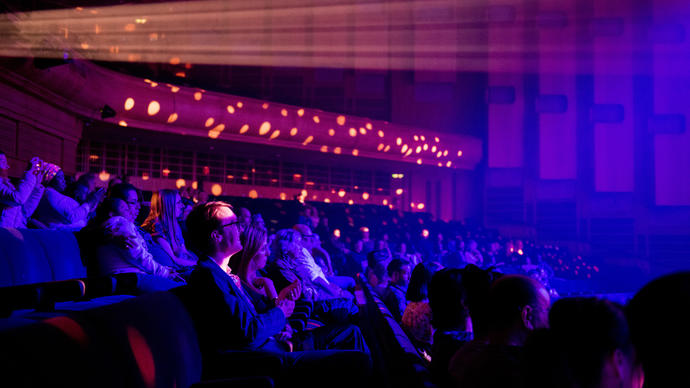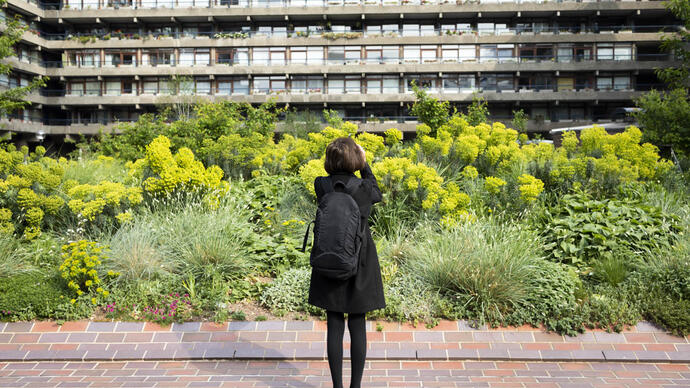
Programme and performers
Scottish Lute Manuscripts (compiled by Lady Margaret Wemyss) A Scotts Tune
Mervell’s Sarabande
Canaries
Holi and Faire
Ladie Lie Near Me
A Scots Tune
Federico Mompou Canción y Danza X (sobre dos Cantigas del Rey Alfonso X)
’Preludio’, ‘Coral’, ‘Canción’ and ‘Muñeira’ from Suite Compostelana
Manuel de Falla Homenaje pour le Tombeau de Claude Debussy
Francis Poulenc Sarabande
Thomas Adès Forgotten Dances (co-commissioned by the Barbican and ECHO Rising Stars, UK premiere)
I Overture – Queen of the Spiders
II Berceuse – The Paradise of Thebes
III Courante – Here was a Swift (for Max Ernst)
IV Barcarolle – The Maiden Voyage
V Carillon de Ville (for Hector Berlioz)
VI Vesper (for Henry Purcell)
Sean Shibe guitar
Sean Shibe
Sean Shibe was born in Edinburgh in 1992, studying at Royal Conservatoire of Scotland under Allan Neave and at Kunst-Universität Graz in Austria and in Italy under Paolo Pegoraro. He is now a guitar professor at Guildhall School of Music & Drama.
He is a former BBC Radio 3 New Generation Artist, Borletti–Buitoni Trust Fellowship 2012 winner, Royal Philharmonic Society 2018 Young Artist Award winner and recipient of the 2022 Leonard Bernstein Award. This season sees him premiere concertos by Cassandra Miller and Oliver Leith, as well as tour Thomas Adès’s Forgotten Dances. He also appears in recital at venues across Europe, including the Royal Concertgebouw Amsterdam, Elbphilharmonie Hamburg, Philharmonie de Paris, Konzerthaus Wien and Wigmore Hall as he takes up the title of ECHO Rising Star. Further highlights comprise a US tour with tenor Karim Sulayman, performances with mezzo-soprano Ema Nikolovska, and the UK premiere of Francisco Coll’s Turia for guitar and large orchestra with Delyana Lazorova and BBC Scottish Symphony Orchestra.
He regularly collaborates with leading soloists and ensembles and in recent years has worked with the Hallé, National Youth Orchestra of Scotland, BBC Singers, Manchester Collective, Dunedin Consort, Quatuor Van Kujik, Danish String Quartet, LUDWIG, Krzysztof Urbański, Christoph Eschenbach, Taavi Oramo, Catherine Larsen-Maguire, flautist Adam Walker, singers Allan Clayton, Ben Johnson, Robert Murray, Robin Tritschler and performance artist Marina Abramović.
He is an ardent supporter of contemporary music, regularly taking a hands-on approach to new commissions and programmes and working with composers to experiment with and expand the guitar repertoire. Premieres to date include works by Daniel Kidane, David Fennessy, Shiva Feshareki, David Lang, Julia Wolfe, Freya Waley-Cohen and Sasha Scott. He is equally committed to traditional repertoire, regularly pairing bold, new pieces with his own transcriptions of JS Bach’s lute suites and 17th-century Scottish lute manuscripts.
Sean Shibe’s discography continues to garner recognition from critics and audiences all over. Recent albums include Lost & Found (awarded an OPUS Klassik 2023 Award), Profesión, exploring 20th-century South American music, and the Grammy-nominated Broken Branches, a kaleidoscopic exploration of everything from 17th-century lute to Arabic oud in collaboration with Karim Sulayman.

Our Patrons and supporters
Find out about our Patrons, who help us keep our programme accessible to everyone and allow us to continue investing in the artists and communities we work with.
Love the arts? Become a Patron to engage more closely with our programme.

Who we are
Meet our management team, our Board and the Trustees of our charitable arm, Barbican Centre Trust.
